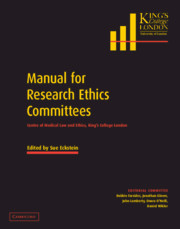Book contents
- Frontmatter
- Contents
- Editorial board
- Acknowledgements
- List of contributors
- Introduction
- Part I
- 1 The ethics of clinical research
- 2 Research ethics committees and the law
- 3 The regulation of medical research: a historical overview
- 4 The regulation of medical research in the UK
- 5 Observational and epidemiological research
- 6 Social survey research
- 7 Approaching qualitative research
- 8 Complementary and alternative medicine: challenges for research ethics committees
- 9 The ethical review of student research in the context of the governance arrangements for research ethics committees
- 10 The ethics of genetic research
- 11 Research or audit?
- 12 Randomised controlled trials
- 13 Determining the study size
- 14 Risk assessment for research participants
- 15 Absorbed radiation in patient and volunteer studies submitted to the ethical committee: a memorandum
- 16 A guide to the use of radioactive materials and radiological procedures for research purposes
- 17 Indemnity in medical research
- 18 The prevention and management of fraud and misconduct: the role of the LREC
- 19 Understanding clinical trials: a model for providing information to potential participants
- 20 The law relating to consent
- 21 Writing information for potential research participants
- 22 The law relating to confidentiality
- 23 Research involving vulnerable participants: some ethical issues
- 24 The ethics of research related to healthcare in developing countries
- Part II
- Index
18 - The prevention and management of fraud and misconduct: the role of the LREC
Published online by Cambridge University Press: 08 January 2010
- Frontmatter
- Contents
- Editorial board
- Acknowledgements
- List of contributors
- Introduction
- Part I
- 1 The ethics of clinical research
- 2 Research ethics committees and the law
- 3 The regulation of medical research: a historical overview
- 4 The regulation of medical research in the UK
- 5 Observational and epidemiological research
- 6 Social survey research
- 7 Approaching qualitative research
- 8 Complementary and alternative medicine: challenges for research ethics committees
- 9 The ethical review of student research in the context of the governance arrangements for research ethics committees
- 10 The ethics of genetic research
- 11 Research or audit?
- 12 Randomised controlled trials
- 13 Determining the study size
- 14 Risk assessment for research participants
- 15 Absorbed radiation in patient and volunteer studies submitted to the ethical committee: a memorandum
- 16 A guide to the use of radioactive materials and radiological procedures for research purposes
- 17 Indemnity in medical research
- 18 The prevention and management of fraud and misconduct: the role of the LREC
- 19 Understanding clinical trials: a model for providing information to potential participants
- 20 The law relating to consent
- 21 Writing information for potential research participants
- 22 The law relating to confidentiality
- 23 Research involving vulnerable participants: some ethical issues
- 24 The ethics of research related to healthcare in developing countries
- Part II
- Index
Summary
Introduction
In an ideal world, fraud or even misconduct in clinical research would not exist; but we do not live in such a world. Accepting, therefore, that they can happen, research ethics committees – particularly local committees – have important roles to play in trying to prevent their occurrence and, if either does occur, to assist in their investigation.
Fraud is much less common than carelessness, though its incidence is difficult to quantify. Nevertheless some element of fraud in clinical trials has been variously estimated (Horton, 1996; Wells, 2001)at between 0.1 and 1% of research projects. As justification for this estimate, there are about 3000 sponsored clinical trials taking place at any one time in the United Kingdom. If the higher figure is assumed, this means that 30 studies may be currently being conducted that could include fraudulent or inaccurately compiled data. Even one case of fraud or other misconduct is one too many. Fraud is likely to exploit patients, deceive the sponsor and may skew the scientific database. Reports of proven cases of fraud in biomedical research are usually greeted with dismay and an element of surprise. Society expects doctors conducting research to be honest and honourable as well as competent – as, indeed, the vast majority of them are.
Definition of research misconduct
At a consensus conference held under the auspices of the Royal College of Physicians in Edinburgh in 1999, a number of definitions of misconduct were discussed. Research misconduct was viewed as including fabrication, falsification and/or suppression of data and plagiarism, as well as unintentional action that undermines the scientific value of the work.
- Type
- Chapter
- Information
- Manual for Research Ethics CommitteesCentre of Medical Law and Ethics, King's College London, pp. 79 - 82Publisher: Cambridge University PressPrint publication year: 2003
- 1
- Cited by



